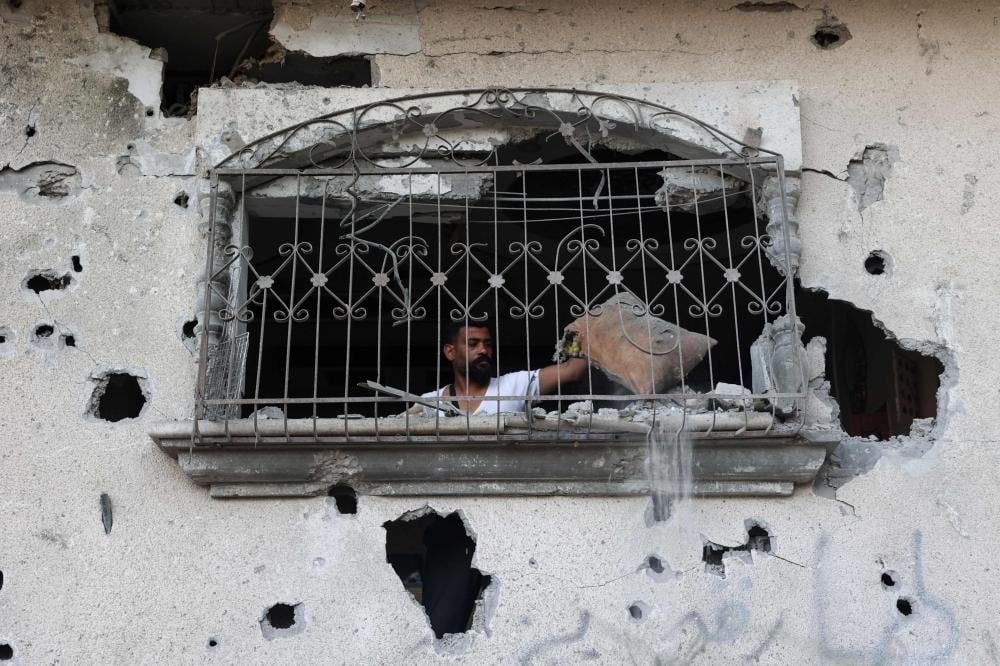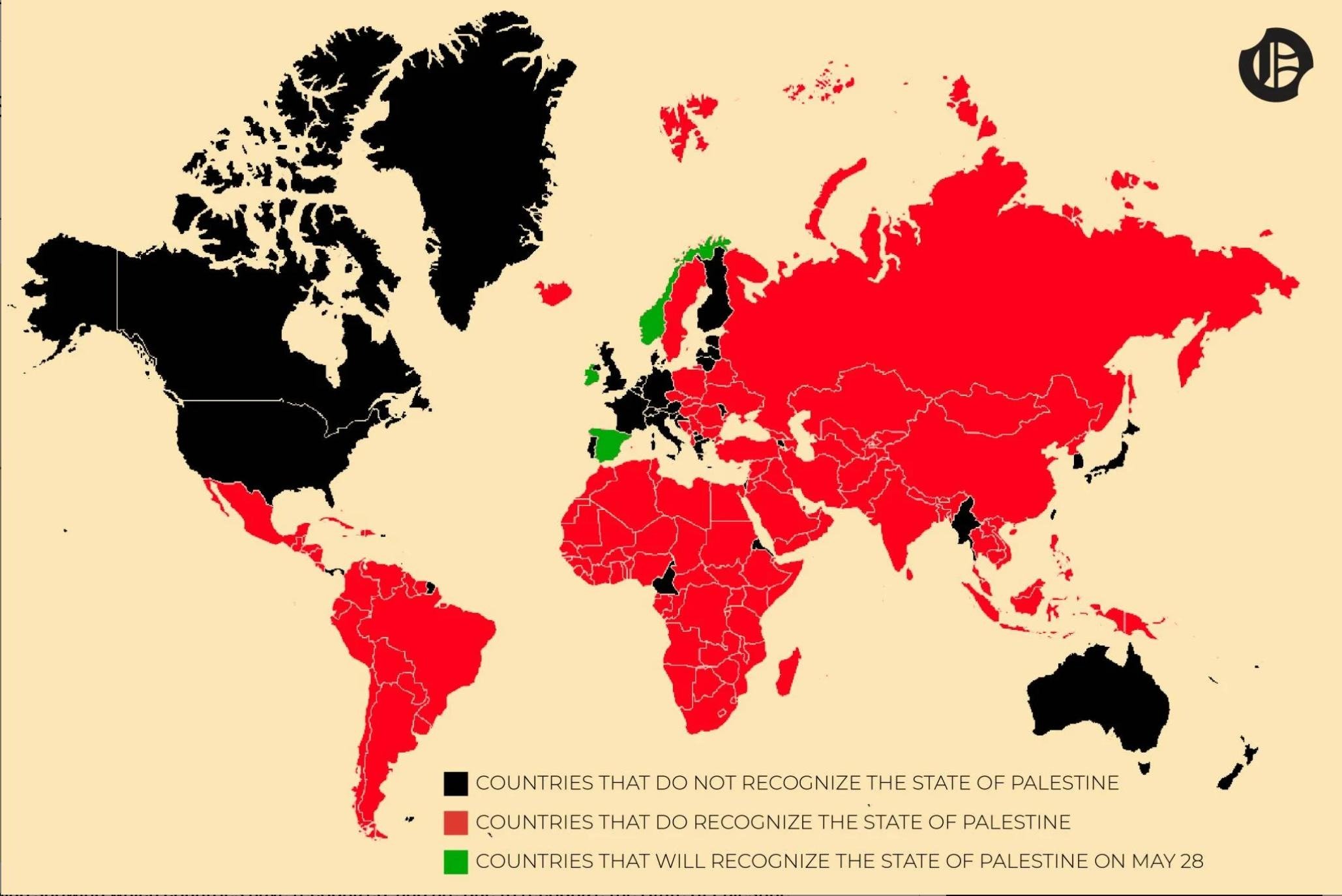
Want to get the Morning Brief by email? Click here to sign up.
Thursday, May 23, 2024.
Compiled by Abbas Mahfouz.

 Some key things to watch today:
Some key things to watch today:
• Strikes continuing on the Lebanese-Israeli border.
• Global reaction to Ireland, Spain and Norway's decision to recognize Palestine as a state.
• Signs of fresh attempts to hold talks on a hostage deal in Gaza.

 SOUTH LEBANON: Two people killed in southern Lebanon
SOUTH LEBANON: Two people killed in southern Lebanon
Two Hezbollah members killed overnight: The party announced the two fighters’ deaths after an Israeli strike hit a house in Odaisseh (Marjayoun), increasing the number of Hezbollah members killed since Oct. 7 to 312 by L’Orient Today’s count.
Several people wounded in Mais al-Jabal: The Amal Movement-affiliated al-Rissala Scout Association announced it delivered first aid on site after Israel bombarded Mais al-Jabal, without specifying the number of people injured.
Électricité du Liban employees under Israeli fire: The state-owned electricity provider said Israeli machine gun fire interrupted technicians who were repairing power lines in Maroun al-Ras.
Key context: Earlier this month, an Israeli drone strike killed a first responder and a repairman sent by public mobile telecoms provider MTC Touch to Tayr Harfa. Israeli attacks have repeatedly interrupted efforts to repair damaged infrastructure and clear roads. With over 90,000 of southern Lebanon’s residents driven out of their homes since Oct. 8, those who remain face prolonged disruptions to water, electricity and telecoms. In January, power outages resulting from Israeli strikes on infrastructure led the South Lebanon Water Establishment to call on residents to ration their water use. During the same period, Mais al-Jabal residents criticized the government’s “neglect” to remedy interruptions caused by the border clashes to electricity, telecoms and water.

 Meeting between caretaker Prime Minister Najib Mikati, Minister of Energy Walid Fayyad and the Lebanese Petroleum Administration on May 22. (Credit: NNA)
Meeting between caretaker Prime Minister Najib Mikati, Minister of Energy Walid Fayyad and the Lebanese Petroleum Administration on May 22. (Credit: NNA)
 ELECTRICITY: Lebanon's public sector electricity bill arrears piling up
ELECTRICITY: Lebanon's public sector electricity bill arrears piling up
“Public administrations and institutions have not paid a single penny to Electricité du Liban [EDL],” Energy Minister Walid Fayyad said. The public power provider again threatened to stop supplying public administrations, giving them until mid-June, this time. The institution made a similar threat in February though it appears to have granted public administrations an extended grace period since the end of month deadline set at the time. Fayyad further pressed for the payments after his meeting with caretaker Prime Minister Najib Mikati, noting that administrations received a treasury advance surpassing $67 million to settle their electricity bills from October 2022 to June 2023.
EDL seeks renewed credit with Arab fund loans now settled: Fayad said EDL sought to improve its electricity distribution and transmission by renovating its Mar Mikhael headquarters — severely damaged by the Aug. 4, 2020 Beirut port blast — using Kuwait Fund for Arab Economic Development financing.
Repeated warning to administrations: Since at least last September, EDL has urged public administrations to pay their electricity dues. Last year EDL began bill collection at new tariffs as part of a plan to boost its coverage, particularly to areas with high bill payment rates. The new tariffs followed decades of operating losses and repeated interruptions to power plant operations over fuel payment issues. The state supplier’s lacunary power provision, reaching several hours per day in some areas of Beirut, has forced the majority of Lebanon’s residents to rely on costly private generator subscriptions.

 A Palestinian man inspects the damage in his apartment after an Israeli airstrike in Rafah in the southern Gaza Strip on May 22, 2024. (Credit:Eyad al-Baba AFP)
A Palestinian man inspects the damage in his apartment after an Israeli airstrike in Rafah in the southern Gaza Strip on May 22, 2024. (Credit:Eyad al-Baba AFP)
 GAZA: At least 35,709 people killed in the enclave since Oct. 7
GAZA: At least 35,709 people killed in the enclave since Oct. 7
Intense overnight assault on Rafah, renewed fighting across Gaza: Palestinians in Rafah told Reuters they experienced unrelenting Israeli bombardments while the military pushed deeper into the southernmost city. Israel issued evacuation orders earlier this month after weeks of intense shelling on Rafah, in its bid to "destroy Hamas". Hundreds of thousands of Palestinians who had fled southward to Rafah, have once again been displaced. International actors have repeatedly warned of the catastrophic humanitarian toll of a ground invasion of Rafah.
 Map showing which countries have recognized, and are due to recognize the State of Palestine. (Illustration: Jaimee Haddad/L'Orient Today)
Map showing which countries have recognized, and are due to recognize the State of Palestine. (Illustration: Jaimee Haddad/L'Orient Today)
Spain, Norway and Ireland to recognize Palestinian state: The announcement sparked joy among Palestinians, hoping it would ripple to other nations. There was also indignation from Israeli officials fearing the same. Israel’s foreign minister ordered the recall of Israeli ambassadors to Spain, Norway and Ireland.
The effects of recognizing a Palestinian state: Norwegian Premier Jonas Gahr Stoere said the decision aimed to “keep alive” the two-state solution, describing it as the only thing that can provide a safe home for both Israelis and Palestinians.” Last month, a majority of the United Nations General Assembly voted in favor of upgrading Palestine from observer to member; however, the realization of such a move requires Security Council approval.

 In other news:
In other news:
• A woman suffered a fatal gunshot wound in the crossfire of an armed clash in Tripoli Tuesday night.
• Lebanon fared poorly in public finance management, according to the Lebanese Association for Taxpayers’ Rights (ALDIC) 2023 report.
• Prices rose by 1.74 percent last month and 59.67 percent from the year before, continuing its year-on-year slowdown since April after four years of triple-digit rates, according to the Central Administration of Statistics’ Consumer Price Index.
• Banque du Liban estimated remittances to Lebanon in 2023 totaled $6.7 billion, up from the previous year and constituting 29 percent of GDP.

 Here is our must-read story from yesterday: Netanyahu faces the frustration of his war cabinet
Here is our must-read story from yesterday: Netanyahu faces the frustration of his war cabinet
L’Orient-Le Jour reporter Noura Doukhi explains the divisions in Israel’s War Cabinet and the mounting pressure on Israel’s premier seven months into the Gaza war.

 Your daily 'light read'
Your daily 'light read'
 The Arab Image Foundation’s collections offer a diverse, sometimes amusing, photo history of Lebanon and the region in the 19th and 20th centuries. (Credit: João Sousa/L’Orient Today)
The Arab Image Foundation’s collections offer a diverse, sometimes amusing, photo history of Lebanon and the region in the 19th and 20th centuries. (Credit: João Sousa/L’Orient Today)
The Arab Image Foundation has moved its archive of more than half a million photographs stemming from 310 collections dating from the 1860s through the 1990s and spanning 50 countries to Qantari, where they make their space “available for whoever needs it, in whatever way it’s needed.”
Read L’Orient Today arts and culture reporter Jim Quilty’s piece to see how cooperation between local cultural institutions brought the foundation’s new locale together, what it means to keep an activist archive and their commitment to solidarity and grassroots change.

Before you go...
Have a suggestion, feedback, or a kind word? You can write to us at this address: editor@lorientlejour.com
